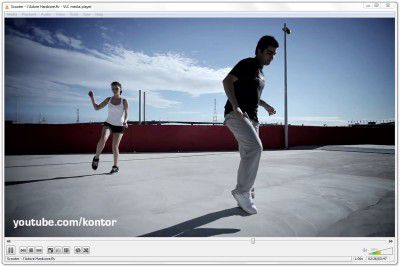- Qualcomm Launches Snapdragon 4 Gen 2 Mobile Platform
- AMD Launches Ryzen PRO 7000 Series Mobile & Desktop Platform
- Intel Launches Sleek Single-Slot Arc Pro A60 Workstation Graphics Card
- NVIDIA Announces Latest Ada Lovelace Additions: GeForce RTX 4060 Ti & RTX 4060
- Maxon Redshift With AMD Radeon GPU Rendering Support Now Available
VLC 1.1.0 Brings Improved Codec Support, GPU Decoding and More
When VideoLAN Project released the 1.0.0 version of VLC last fall, it delivered a piece of software well worth its major version increment, thanks to countless bug fixes and a complete framework overhaul. As impressive as that release was, though, the developers seem to have outdone themselves with the just-launched 1.1.0 version which brings a ton of worthwhile improvements.
One of the most notable additions to this release is proper GPU decoding on both Windows and Linux installations. This decoding acceleration will take effect on H.264, VC-1 and MPEG-2 formats, and will utilize DxVA2 on Windows and VAAPI on Linux. According to the developers, only NVIDIA cards at this point in time will work properly due to issues with AMD’s drivers, but according to AMD itself, a fix will come to a future Catalyst release.
Adding to its HD capabilities even further, MKV support has been improved with seeking fixes and 7.1 channel codec support, and while on the topic of codecs, MPEG-4 lossless and VP8 support has also been tossed in. Along the same lines, the audio experience has gotten better with increased codec support, including MPEG-4 ALS, Vorbis 6.1/7.1, FLAC 6.1/7.1 and more. For those with DVD-Audio discs, VLC will also begin to naturally support those as well.
For developers and scripters, 1.1.0 also proves to be more customizable, and if you understand the lua programming language, you’re set. Other major gains come courtesy of various improvements that have made the program lighter and faster. You can expect 40% speed boosts to HD decoding and heavier utilization of the SSSE3 and SSE4 instruction sets.
If you’re a VLC user, you owe it to yourself to download the latest version. With the amount of additions and improvements seen here, the 0.1 version increment actually seems quite modest. One thing I didn’t mention though is the removal of Shoutcast. If you happen to use that feature in VLC, you can learn of the reason it was pulled in a bulletin here.
VideoLAN and the VLC development team are proud to present the first major release of the ‘The Luggage’ branch of the popular media player and media framework. This release brings many major improvements, especially: GPU and DSP decoding on selected platforms, new support for codecs, demuxers and muxers, Lua extensions and Lua content extensions (luaSD), improved interfaces, Video Output rework, removal of lots of modules, rewrite of many in order to improve performance, in CPU, RAM and I/O. It introduces also new libVLC and new bindings and improves the port on many platforms.





